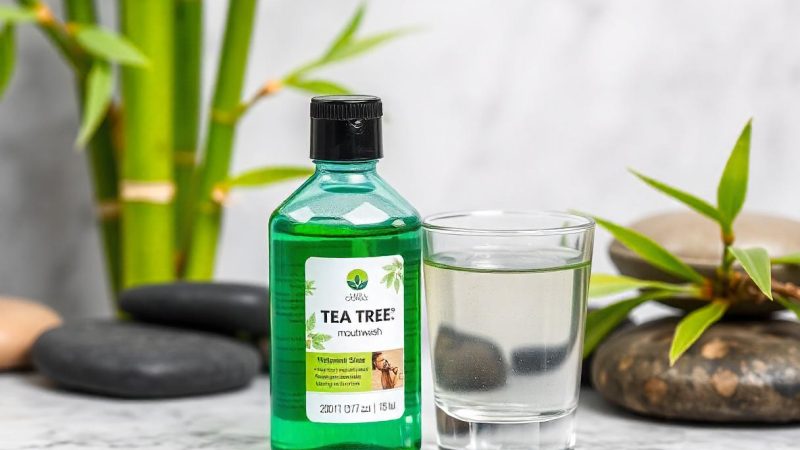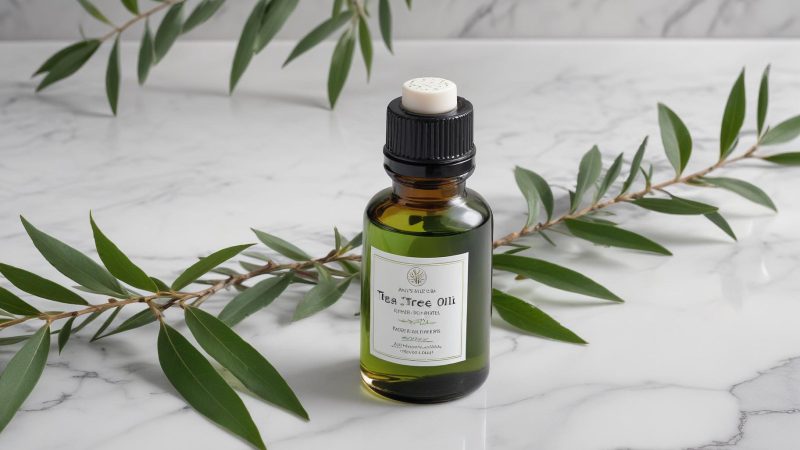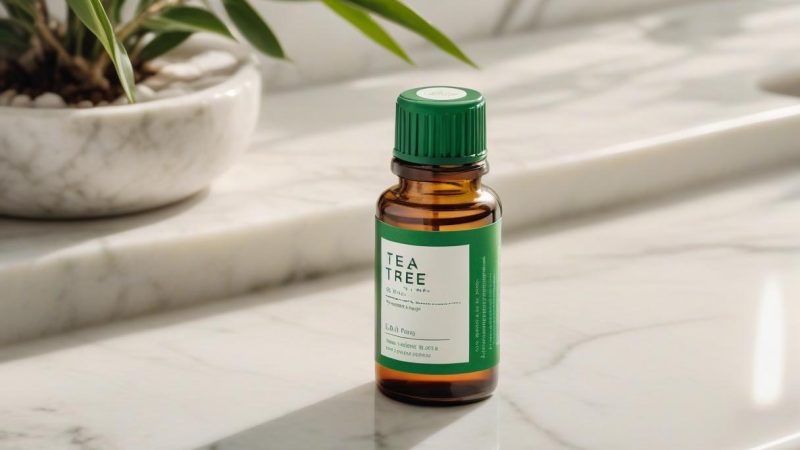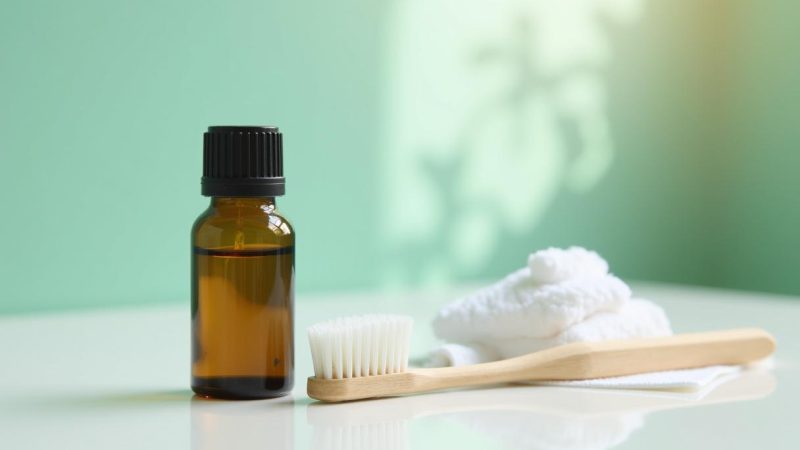Tea Tree Oil in Oral Care: Benefits, Uses, and Scientific Evidence

Tea Tree Oil in Oral Care: Benefits, Uses, and Scientific Evidence
Tea tree oil, extracted from the leaves of the Melaleuca alternifolia tree, has been widely used in traditional medicine due to its antimicrobial and anti-inflammatory properties. While commonly associated with skincare and hair treatments, tea tree oil is also gaining popularity in oral care. Its natural antiseptic qualities make it a powerful ally in maintaining oral hygiene, combating gum disease, and preventing bad breath. In this article, we’ll explore how tea tree oil can be incorporated into oral care routines, supported by scientific research, and explain its potential benefits for a healthy mouth.
What is Tea Tree Oil?
Tea tree oil is an essential oil that has long been used for its medicinal properties, particularly in treating infections and wounds. It is highly regarded for its antiseptic, antibacterial, antifungal, and anti-inflammatory effects. In oral care, these properties are particularly beneficial for preventing and treating conditions like gum disease, oral infections, and bad breath.
Benefits of Tea Tree Oil for Oral Health
Tea tree oil offers a range of benefits for maintaining oral health due to its ability to kill harmful bacteria, reduce inflammation, and promote healing. Here are the key ways tea tree oil supports oral care:
1. Antibacterial Properties
Tea tree oil is known for its potent antibacterial properties, which can help prevent the growth of harmful bacteria in the mouth. These bacteria are often responsible for oral health issues such as plaque formation, cavities, and gum disease.
- Scientific Backing: A study published in the Australian Dental Journal found that tea tree oil significantly reduced the presence of Streptococcus mutans and Lactobacillus acidophilus, two types of bacteria linked to tooth decay and plaque formation (Hammer, K., et al., 2003). The oil’s antibacterial effects make it an effective ingredient in mouthwashes and toothpastes aimed at reducing plaque and preventing cavities.
2. Prevents Gum Disease (Gingivitis and Periodontitis)
Gum disease, including gingivitis and periodontitis, is caused by bacterial buildup in the mouth, leading to inflammation and infection in the gums. Tea tree oil’s antibacterial and anti-inflammatory properties can help manage and prevent these conditions by reducing bacteria and calming inflamed gums.
- Scientific Backing: A clinical trial published in the Journal of Clinical Periodontology showed that using a mouthwash containing tea tree oil significantly reduced gingival inflammation and bleeding in individuals with chronic gingivitis (Soukoulis, S., et al., 2004). The researchers concluded that tea tree oil could be an effective adjunct to mechanical plaque control in treating gum disease.
3. Fights Bad Breath (Halitosis)
Bad breath, or halitosis, is often caused by the accumulation of bacteria in the mouth, especially in hard-to-reach areas like the back of the tongue. Tea tree oil’s antimicrobial properties help neutralize the bacteria responsible for bad breath, providing a natural solution to halitosis.
- Scientific Backing: Research published in the Journal of Contemporary Dental Practice demonstrated that tea tree oil’s antimicrobial activity was effective in reducing bacterial colonies in the oral cavity, including those responsible for bad breath (Groppo, F. C., et al., 2002). When used as a mouthwash or in toothpaste, tea tree oil can help keep the mouth fresh and odor-free.
4. Treats Oral Thrush
Oral thrush is a fungal infection caused by an overgrowth of Candida albicans, often seen in individuals with weakened immune systems, such as those undergoing antibiotic or steroid treatments. Tea tree oil’s antifungal properties can be helpful in treating and preventing oral thrush.
- Scientific Backing: A study published in Antimicrobial Agents and Chemotherapy found that tea tree oil exhibited strong antifungal activity against Candida albicans, the fungus responsible for oral thrush (Carson, C., et al., 2006). The oil can be used as a natural remedy to reduce fungal infections in the mouth, although it should be properly diluted to avoid irritation.
5. Reduces Inflammation and Promotes Healing
Tea tree oil’s anti-inflammatory properties help reduce swelling and inflammation in the mouth, making it effective for treating conditions like gum inflammation (gingivitis) and sores inside the mouth. It can also promote faster healing of oral wounds, such as those caused by dental surgery or injury.
- Scientific Backing: A review published in the Journal of Ethnopharmacology highlighted tea tree oil’s ability to reduce inflammation and promote tissue repair, suggesting its potential in treating oral ulcers and other inflammatory conditions in the mouth (Cox, S. D., et al., 2006). The oil helps calm irritated tissues while providing antiseptic protection to prevent infections during the healing process.
How to Use Tea Tree Oil for Oral Care
Tea tree oil is a powerful essential oil, and it must be used with caution when applied to the sensitive tissues of the mouth. Here are some safe and effective ways to incorporate tea tree oil into your oral care routine:
1. Tea Tree Oil Mouthwash
Tea tree oil can be used to make a homemade mouthwash that helps reduce bacteria, freshen breath, and soothe inflamed gums.
- How to Use: Add 2-3 drops of tea tree oil to a cup of warm water. Swish the mixture around your mouth for 30 seconds to 1 minute, being careful not to swallow. Spit it out and rinse your mouth with plain water afterward. Use this mouthwash 2-3 times a week for best results.
2. Tea Tree Oil Toothpaste
You can add tea tree oil to your regular toothpaste or use a natural tea tree oil-based toothpaste to help reduce plaque buildup and maintain fresh breath.
- How to Use: Add a drop of tea tree oil to your toothbrush alongside your usual toothpaste. Brush your teeth as normal, ensuring that you thoroughly clean all areas of your mouth. Rinse well to remove any residual oil.
3. Gum Treatment
Tea tree oil can be applied to the gums to reduce inflammation and fight bacterial infections.
- How to Use: Mix 1-2 drops of tea tree oil with a teaspoon of coconut oil or olive oil. Gently massage the mixture onto your gums, focusing on any areas of inflammation or soreness. Leave the treatment on for 5-10 minutes before rinsing your mouth with water.
4. Tea Tree Oil for Oral Thrush
For those suffering from oral thrush, tea tree oil can be used as an antifungal treatment.
- How to Use: Dilute 2-3 drops of tea tree oil in a cup of warm water. Swish the mixture around the mouth for a minute before spitting it out. Use this treatment once or twice daily until symptoms improve. Be cautious not to ingest tea tree oil, as it can be toxic if swallowed.
Precautions When Using Tea Tree Oil in Oral Care
Tea tree oil is highly potent, and improper use can lead to side effects or irritation. Follow these precautions to ensure safe usage:
- Dilute Properly: Tea tree oil should always be diluted with water or a carrier oil before being used in the mouth. Direct application of undiluted tea tree oil can cause irritation, burning, or allergic reactions.
- Avoid Swallowing: Tea tree oil is toxic if ingested in significant amounts. Always spit out any oral care products containing tea tree oil and rinse your mouth thoroughly afterward.
- Patch Test: Before using tea tree oil in your mouth, perform a patch test on the skin to ensure you are not allergic or sensitive to the oil.
- Consult a Professional: If you have severe gum disease, oral infections, or other serious dental conditions, consult a dentist before incorporating tea tree oil into your oral care routine.
Conclusion
Tea tree oil offers a natural, effective solution for improving oral health. Its antibacterial, antifungal, and anti-inflammatory properties make it a versatile tool for fighting gum disease, reducing bad breath, and treating oral infections like thrush. When used properly, tea tree oil can be an excellent addition to your oral care routine, providing both preventative and therapeutic benefits. However, as with any essential oil, caution should be exercised to ensure safe use, especially in sensitive areas like the mouth.
References
- Hammer, K., et al. (2003). Antibacterial effects of tea tree oil on oral bacteria. Australian Dental Journal.
- Soukoulis, S., et al. (2004). Tea tree oil mouthwash as an adjunct to mechanical plaque control in chronic gingivitis. Journal of Clinical Periodontology.
- Groppo, F. C., et al. (2002). Efficacy of tea tree oil in reducing oral malodor. Journal of Contemporary Dental Practice.
- Carson, C., et al. (2006). Antifungal activity of tea tree oil against Candida albicans. Antimicrobial Agents and Chemotherapy.
- Cox, S. D., et al. (2006). The role of tea tree oil in reducing inflammation and promoting oral health. Journal of Ethnopharmacology.






